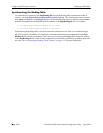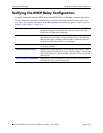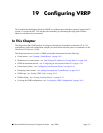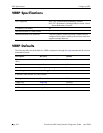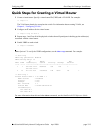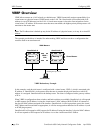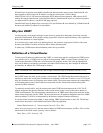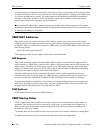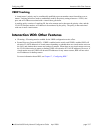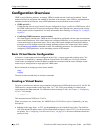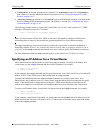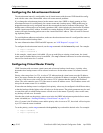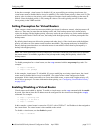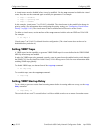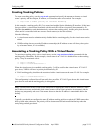
VRRP Overview Configuring VRRP
page 19-6 OmniSwitch 6600 Family Network Configuration Guide April 2006
If backup routers are configured with priority values that are close in value, there may be a timing conflict,
and the first backup to take over may not be the one with the highest priority; a backup with a higher prior-
ity will then preempt the new master. The virtual router may be configured to prohibit any preemption
attempts, except by the IP address owner. An IP address owner, if it is available, will always become
master of any virtual router associated with its IP addresses.
Note. Duplicate IP address/MAC address messages may display when a backup takes over for a master,
depending on the timing of the takeover and the configured advertisement interval. This is particularly true
if more than one backup is configured.
VRRP MAC Addresses
Each virtual router has a single well-known MAC address, which is used as the source in all periodic
VRRP advertisements sent by the master router, any other packets originating from the master router, and
as the MAC address in ARP replies (instead of a VRRP router’s physical MAC address). The address has
the following format:
00-00-5E-00-01-[virtual router ID]
This mapping provides for up to eight virtual routers on an OmniSwitch.
ARP Requests
Each virtual router has a single well-known MAC address, which is used as the MAC address in ARP
replies instead of a VRRP router's physical MAC address. When an end host sends an ARP request to the
master router’s IP address, the master router responds to the ARP request using the virtual router MAC
address. If a backup router takes over for the master, and an end host sends an ARP request, the backup
will reply to the request using the virtual router MAC address.
Gratuitous ARP requests for the virtual router IP address or MAC address are broadcast when the
OmniSwitch becomes the master router. For VRRP interfaces, gratuitous ARP requests/responses are
delayed at system boot until both the
IP address and the virtual router MAC address are configured.
If an interface IP address is shared by a virtual router, the routing mechanism does not send a gratuitous
ARP for the IP address (since the virtual router will send a gratuitous ARP). This prevents traffic from
being forwarded to the router before its routing tables are stable.
ICMP Redirects
ICMP redirects are not sent out over VRRP interfaces.
VRRP Startup Delay
When a virtual router reboots and becomes master, it may become master before its routing tables are
populated. This could result in loss of connectivity to the router. To prevent the loss in connectivity, a
delay is used to prevent the router from becoming master before the routing tables are stabilized; the
default delay value is 45 seconds.
The startup delay may be modified to allow more or less time for the router to stabilize its routing tables.
In addition to the startup delay, the switch has an ARP delay (which not configurable).



